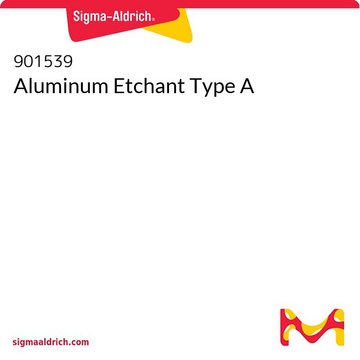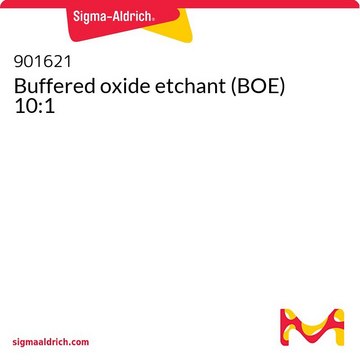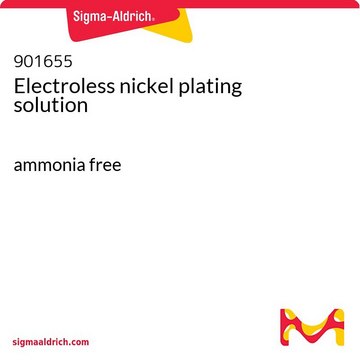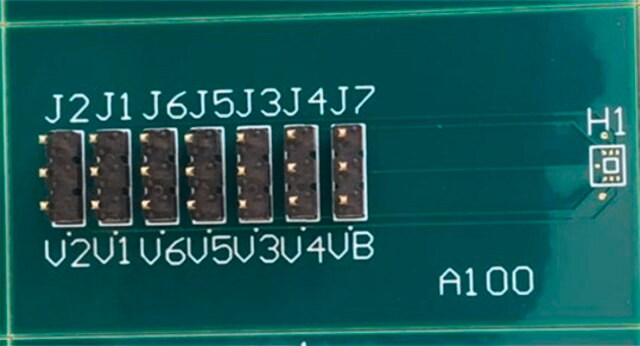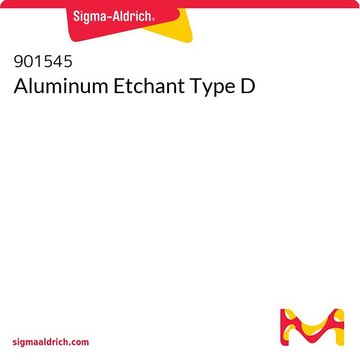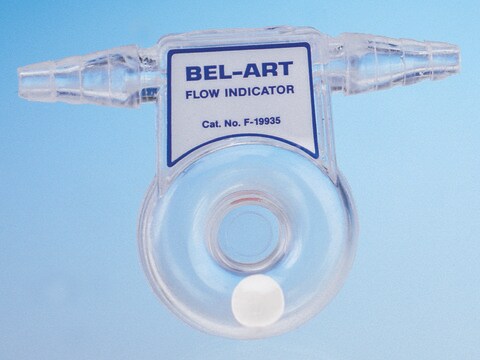901667
Buffer HF improved
with surfactant
Synonym(e):
BHF
About This Item
Empfohlene Produkte
Form
liquid
Farbe
colorless
pH-Wert
3-5
Lagertemp.
15-25°C
Suchen Sie nach ähnlichen Produkten? Aufrufen Leitfaden zum Produktvergleich
Allgemeine Beschreibung
Advantages:
- Ready-to-use - Economical
- HF activity buffer stabilized
- Excellent process reproducibility
- Does not undercut masked oxide
- Will not stain diffused silicon surfaces
- Avoids contamination on silicon surfaces
- Photoresist coating unaffected
Buffer HF improved is an idealized buffer preparation characterized by a high buffer index and an optimized, uniform oxide-etch rate. The composition of buffer HF improved is precisely controlled by HF activity measurements and electrometric pH. The mass balance corresponds essentially to (HF) + (F) + 2(HF2) for a two-ligand mononuclear complex and the charge balance is (H+) - (F) + (HF2- ). The HF activity is maintained constant through the specific equilibrium constant which regulates the equilibrium reaction between fluoride, bifluoride, and HF buffer components. A second equilibrium constant participates in the regulation of the hydronium in concentration of pH.
Buffer HF improved is produced and analyzed to be essentially free of impurities. Nitrate ions, a common impurity causing stains on diffused silicon surfaces, are specifically removed. Heavy metal impurities, which can lead to degradation of device characteristics, are rigidly controlled under manufacturing process specifications.
Anwendung
Buffer HF improved dissolves silica films (both thermally grown and silane SiO2) produced on the surfaces of silicon and exposed by photolithography. It also is capable of dissolving doped silica films such as phosphosilica and borosilica glasses as formed in semiconductor processing.
The overall chemical reaction is: 4HF + SiO2 SiF4 + 2H2O
For trouble-free operation Buffer HF improved is recommended in the new technologies for manufacture of semiconductor planar and mesa devices. It is compatible with both negative and positive photoresists. Excellent results with good reproducibility are simple to achieve without undercutting marked oxides, surface staining or device degradation by metallic impurities.
Angaben zur Herstellung
Most practical oxide passivation layers range from 2000 Å to 5000 Å in thickness, and good results are obtained by exposure in Buffer HF improved for 2 to 5 minutes at room temperature. Exposure time may be decreased or increased if necessary. Buffer HF improved should be rinsed off with deionized water. The high buffer index of Buffer HF improved permits repeated use of the buffer at fixed exposure time. For faster etch rate (approx. 2X) use Buffer HF improved at 35 °C.
Signalwort
Danger
H-Sätze
Gefahreneinstufungen
Acute Tox. 1 Dermal - Acute Tox. 2 Inhalation - Acute Tox. 2 Oral - Eye Dam. 1 - Skin Corr. 1A
Lagerklassenschlüssel
6.1B - Non-combustible acute toxic Cat. 1 and 2 / very toxic hazardous materials
WGK
WGK 2
Flammpunkt (°F)
Not applicable
Flammpunkt (°C)
Not applicable
Zulassungslistungen
Zulassungslistungen werden hauptsächlich für chemische Produkte erstellt. Für nicht-chemische Produkte können hier nur begrenzte Angaben gemacht werden. Kein Eintrag bedeutet, dass keine der Komponenten gelistet ist. Es liegt in der Verantwortung des Benutzers, die sichere und legale Verwendung des Produkts zu gewährleisten.
EU REACH Annex XVII (Restriction List)
Hier finden Sie alle aktuellen Versionen:
Analysenzertifikate (COA)
Die passende Version wird nicht angezeigt?
Wenn Sie eine bestimmte Version benötigen, können Sie anhand der Lot- oder Chargennummer nach einem spezifischen Zertifikat suchen.
Besitzen Sie dieses Produkt bereits?
In der Dokumentenbibliothek finden Sie die Dokumentation zu den Produkten, die Sie kürzlich erworben haben.
Artikel
Professor Gogotsi and Dr. Shuck introduce MXenes: a promising family of two-dimensional materials with a unique combination of high conductivity, hydrophilicity, and extensive tunability.
Unser Team von Wissenschaftlern verfügt über Erfahrung in allen Forschungsbereichen einschließlich Life Science, Materialwissenschaften, chemischer Synthese, Chromatographie, Analytik und vielen mehr..
Setzen Sie sich mit dem technischen Dienst in Verbindung.

